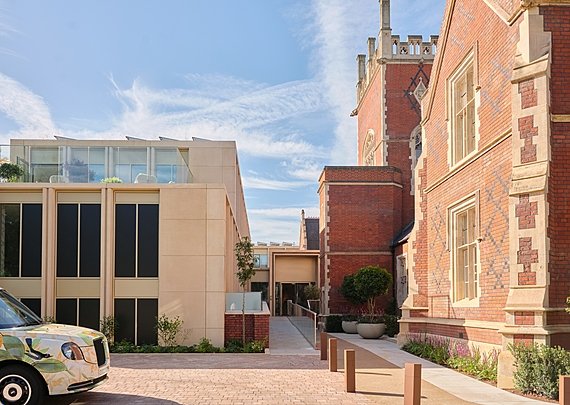192 Sloane Street, London SW1X 9QX

What Rights Do Residents Have in a Care Home?
Moving to a care home can be an exciting and fulfilling stage in anyone’s life. However, it is a decision to take carefully. It’s natural to have questions about the type of care and support that residents are entitled to receive.
It’s important to understand your rights in a care home, so that you can advocate for yourself and your loved ones. Knowing what to expect as a resident can also help to reassure you and set your mind at ease.
At KYN, we do our utmost to respect and support our residents to live exactly as they prefer, wherever possible. In this article, we will discuss residents' rights in care homes in the UK, and how these rights should be upheld.
Care Home Residents’ Rights (UK): What Does the Law Say?
Social care in the UK is strictly regulated and monitored. All services must adhere to regulations, standards and guidelines laid out to protect residents' human rights. This ensures their care needs and wishes are appropriately met.
In care homes, the Care Quality Commission is responsible for evaluating how well these standards are upheld. The specific legal rights for residents in a care home are detailed within the Health and Social Care Act 2008 (Regulated Activities) Regulations 2014.
These laws are designed to safeguard the health, wellbeing and independence of all residents, and promote high-quality care. They also ensure that the care home is properly registered and keeps accurate, up-to-date records.
Here are some of the most important legal rights that care home residents are entitled to. They are mandatory for all residential and nursing homes, whether privately owned or run by a local authority.
Person-Centred Care
All residents have the right to receive tailored care that meets their individual assessed care needs. This means that staff should get to know you personally, and understand your unique preferences, interests and requirements.
The care needs of each resident must be individually assessed prior to a detailed care plan being created. These should be reviewed and updated on a regular basis. The person receiving care should be involved in creating and then agreeing the plan.
If preferred by the resident, their next of kin or loved one may also be included. This may be also appropriate in the event of the resident having compromised mental capacity.
Dignity and Respect
All residents in a care home have the right to be treated with dignity and respect. This includes staff using appropriate language, providing help with personal needs in a caring and discreet way, and maintaining your privacy.
As outlined in the Equality Act 2010, residents should be treated equally, and must not be discriminated against based on:
- Age
- Disability
- Sex or gender
- Marital status
- Race or culture
- Religion or belief
- Sexual orientation
Staff also have a duty to support residents' autonomy and independence. This may involve encouraging you to stay active and involved in meaningful activities, and to make your own choices about your care and lifestyle.
Consent
As a care home resident, you have the right to give and withdraw consent to any type of care. This applies to routine procedures like bathing, dressing and eating, as well as taking medications and receiving treatments or therapies. This means that staff should ask your permission before providing care, and respect you if you say no.
If a resident lacks the capacity to give consent, staff must follow the guidance set out in the Mental Capacity Act 2005. This means they must follow your previously expressed or known wishes wherever possible. They should also consult with experts and your next of kin (where appropriate) before making decisions. All decisions must be deemed to be the least restrictive for the rights of resident.
Safe Care and Treatment
All residents in a care home have the right to safe care and treatment. This means that you should receive care that meets your needs and does not cause you any harm. Staff are required to assess any risks to residents' health and safety and do everything they can to mitigate these risks.
Carers must be properly trained, and have the necessary competence, skills and experience. They should also follow safety procedures with regards to:
- Handling and administering medications
- Using equipment (e.g. hoists)
- Preventing and controlling the spread of infection
The home itself must also be clean, secure and fit for purpose. The premises and all equipment provided should be properly maintained to good standards of hygiene.
Safeguarding from Abuse
All residents have the right to be protected from abuse. This includes:
- Physical abuse
- Sexual abuse
- Verbal and psychological abuse
- Neglect
- Misappropriation of money or property (including theft)
Staff must treat you in a way that is not harmful, degrading or disrespectful of your needs. They must also avoid using force to control or restrain residents unless it is absolutely necessary to prevent harm.
Care home staff must be aware of the signs of abuse and have systems in place to prevent it. Any allegation or evidence of abuse must be immediately reported to the Local Authority and fully investigated.
Meeting Nutritional Needs
All residents in a care home have the right to have their nutritional and hydration needs met. This means that your care home should provide suitable, nutritious food and drink that is adequate for maintaining good health. Staff must also provide dietary supplements when prescribed by a health professional and help residents to eat and drink if necessary.
You also have the right for your dietary requirements to be respected and provided for. This includes allergies, intolerances and food preferences, as well as cultural, religious and philosophical beliefs.
Making Complaints
Part of your individual rights in a care home involves being able to express your views regarding your care and make official complaints. This includes any concerns or dissatisfaction with the quality of your care, the home itself or the conduct of staff.
All complaints must be investigated, and action taken to mitigate any failures identified. There should be an effective system in place to receive, record and respond to complaints. Care home staff must report all complaints and responses to the Care Quality Commission when requested to do so.
Discover KYN: Personalised Holistic Care in the South East
At KYN, we are passionate about providing the highest standards of care for all of our residents. We believe that everyone has the right to receive bespoke, holistic and respectful support in a safe and relaxing environment.
By getting to know each individual personally, our carers strive to enrich the lives of everyone who calls KYN home. Our residents enjoy delicious, nutritious meals and a varied programme of intellectual, social and cultural activities.
If you would like to find out more about our care homes, or the care we provide, contact KYN today. To request a visit or brochure, fill in our enquiry form or call us on +44 (0) 20 3535 1923.

